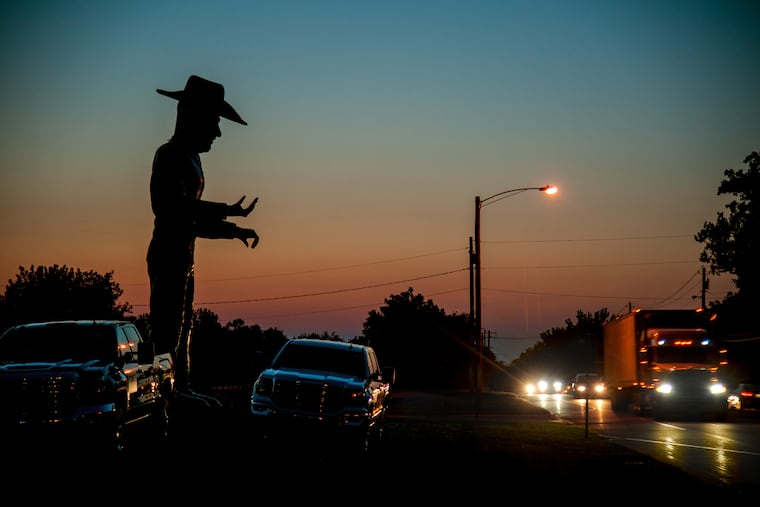In New Jersey’s most rural county, many officials and business owners press to reopen
Salem County is New Jersey’s most rural area, with a population density of only 195 people per square mile.

There were no tumbleweeds blowing through Salem County Wednesday morning, but a steady wind made the creeks ripple and reeds bend along the back roads. At the Cowtown Rodeo and its adjacent flea market, no bulls were bucking, no customers bartering.
In the small, historic city of Salem, where a stately 600-year-old oak tree finally fell last year, the iconic Salem Oak Diner sat closed across the street, Easter decorations still in the windows. A sign on the door said, “We hope to see you all back soon,” but residents are concerned the closure will be permanent.
That’s the way things are going in the rest of New Jersey’s most rural county, too — a steady and quiet limbo until New Jersey Gov. Phil Murphy lifts COVID-19 restrictions there. Business owners and elected officials in this county of 62,300 are hoping they can get special consideration, pointing out that Salem County is very different from the rest of the densely populated state. On Wednesday night, during the monthly meeting, the board of elected freeholders passed a resolution urging Murphy to reopen the county, describing the outbreak there as “mild.”
“Salem County is uniquely vulnerable economically in that it consists of mainly small business and farms and thus the working families of our county are in dire need of reopening of our businesses to support our well-being ...,” the resolution read.
When asked whether Murphy would comment specifically on Salem County’s request, a spokesperson said the governor had earlier addressed the issue of counties proposing individual reopening plans — there have been at least two others — during Wednesday afternoon’s virtual press conference.
“Very happy to see folks really thinking this through at a tactical level,” Murphy said, “but we move as one state.”
The Chamber of Commerce for Southern New Jersey, in its “Economic Reopening and Recovery Plan” published last week, argued against the one-size-fits-all approach.
“South Jersey, given the demographics of the region, is better positioned to reopen quickly and safely,” the plan stated. “It is less densely populated, has more overall open space, and less heavily used public transportation.”
Salem County’s population density is 195 people per square mile, the lowest in the state. As of Thursday morning, it had 484 confirmed cases of COVID-19 and 24 deaths. Hudson County, 125 miles north, has a population density of 13,495 people per square mile, with 17,814 confirmed cases and 1,121 deaths.
“A lot of New Jersey, up by New York, is what’s really affecting southern businesses,” said R.J. Griscom, 34, president of Cowtown Rodeo.
» READ MORE: Memorial Day weekend at the Jersey Shore: Masked beach patrols, relaxed open-container laws, overflowing trash cans
Cowtown, the oldest continuous weekly rodeo in the United States, was set to kick off its 66th season Saturday night in Pilesgrove Township. Every Saturday from Memorial Day to late September, up to 2,500 customers would fill its outdoor arena, making it Salem County’s largest tourist attraction.
Griscom said he needs 1,000 people through the gates just to break even.
“This will be the first time we’ve missed opening night. Ever,” he said. “And whether I’m having a rodeo or not, I still have to feed the animals. I still have to pay bills.”
Also closed is the flea market, where vendors sell clothes, food, and home goods — like Walmart 17 miles southwest in Pennsville, which has been allowed to stay open.
On summer Saturdays, Scott Donnioni can hear the rodeo from Auburn Road Vineyards, which he started in 2007 in Pilesgrove. Donnioni, 52, said he’s been open for takeout and has been actively planning how he’ll keep customers masked and properly distanced when his place is fully back in business. Still, he’s cautious, knowing that customers travel from Wilmington and even New York City to the 16-acre, former pasture-turned-winery.
Salem County is just 30 miles south of Philadelphia and the first stop in New Jersey for motorists traveling north on the Delaware Memorial Bridge.
» READ MORE: Atilis Gym in Bellmawr closed by state Health Department after reopening against Gov. Murphy’s orders
“I couldn’t put up a sign that says, ‘Salem County residents only,' " Donnioni said. “I get why the governor is doing what he’s doing, and I understand what the freeholders are saying. I don’t want to see this again. Opening up, only to have to close down again, would be disastrous.”
Salem County formed a “Re-Opening Task Force” earlier this month that aimed to get Murphy’s attention. Several business owners on the task force deferred to the elected freeholders for comment.
Freeholder Mickey Ostrum said there aren’t many tourist attractions in the county, aside from Cowtown and the wineries.
“People tend to stay in Salem County with or without a pandemic,” Ostrum said.
In Lower Alloways Creek, deep into Salem County where fresh and saltwater start to mingle, many driveways are filled with boats and crab traps. About one-third of the 72-square-mile municipality is made up of water. The local fire department has hosted muskrat dinners for decades.
“It’s definitely a world of its own down here,” said Aidan Hassler Wilson, co-owner of Lisa’s Place Salon. “We’re not on top of each other. It’s a lot of farms, a lot of waterways workers.”
Hassler Wilson’s father, Charles V. Hassler, is a county freeholder.
While the salon is closed, Hassler Wilson and co-owner Brandi Rosenholtz are remodeling, painting the walls, and spreading out hair stations so customers will be able to stay 6 feet apart. They don’t plan to open without consent.
“If we just opened, they could take our licenses,” Rosenholtz said. “They could take everything.”